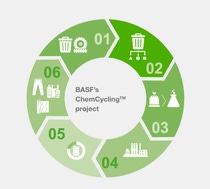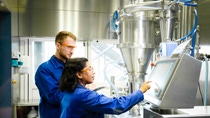Fuel and Lubricant Solutions
Sustainability - BASF Fuel and Lubricant Solutions
Lubricant Components Sustainability Solutions

Circular Economy
- Cradle to grave
(Life cycle analysis) - Cradle to cradle
(circular economy) - Bio-renewable (BMB)
- Bio-based (SSBO; RSPO)
- Sustainable packaging
Climate Protection instead of low carbon
- Energy efficiency
- Product carbon footprint
- reduced CO2 products
- Journey to green energy
- LCA Methodology standardization / partnerships
- Digitalization
Application Benefits
- Marine
- E-mobility
- Aviation
- Bio-hydraulics
- MWF
Eco-friendly Chemicals
- Clean label
- Sustainability and regulatory services
- Environmental / food contact
- Safer chemistry (LUSC)
- Water Management
- Biodiversity and Ecosystems protection
- Safe work environment
Discover Our Customer Portal
Climate Protection
Climate change is the biggest challenge of our time, we as BASF aim to achieve net zero CO2 emissions by 2050. To achieve this, we become more efficient in our production and energy usage, we will increase our use of renewable energies and we will accelerate the development and deployment of new CO2-free processes for the production of chemicals.
Circular Economy
Circular economy means decoupling growth from resource consumption.
BASF is driving circular economy by making the most of the limited resources of our planet: We keep them in use for as long as possible, minimize waste and create value with renewable resources. For this, we contribute to close and extend the loops by developing and implementing circular solutions for the materials we source, further optimizing our operations and offering resource-efficient products and services which support our customers’ circularity journeys.
Bio-renewables
The development of chemicals based on biological feedstocks is critical for a sustainable future and BASF is proud to offer lubricant components from bio-renewable feedstocks as part of our circular solutions offering. Whether these are bio-based raw materials or leveraging renewable raw materials to substitute fossil resources, we are continuously developing our lubricants components portfolio to offer the most advanced sustainability solutions to lower our environmental footprint.
Cradle-to-cradle (Lifecycle analysis)
Product carbon footprints (PCFs) allow companies to compare products' direct process CO2 emissions, energy demand and scope 3 upstream CO2 emissions. With a joint lifecycle analysis (LCA), we can take you one step further. LCAs additionally include the use and end-of-life phase. This allows for a comparison of performance and sustainability advantages after production. For many lubricant applications, the benefit is only visible when looking at the whole lifecycle. Above that, additional environmental impact categories, such as land use or water consumption, can be included in an LCA.

01
Consumers use and dispose plastic products (e.g. packaging, tyres)
05
BASF can allocate the recycled feedstock to all chemicals produced in this Verbund via a certified mass balance approach.
06
Our customers use these chemicals to make their own products
02
Waste companies collect and sort the waste and supply BASF’s technology partners with it
03
Our partners convert the plastic waste into pyrolysis oil through a thermochemical process
04
Pyrolysis oil is purified to be used as feedstock at the beginning of BASF’s Verbund production
- LCA data can show products' (sustainability) performance in application and end-of-life phases
- Backward integrated production enables primary data instead of industry averages
- BASF's sustainability knowhow and expertise ensure high-quality results
Have questions about our LCA calculations and how we can support you?
Contact us here
Discover More
about our lubricant components





